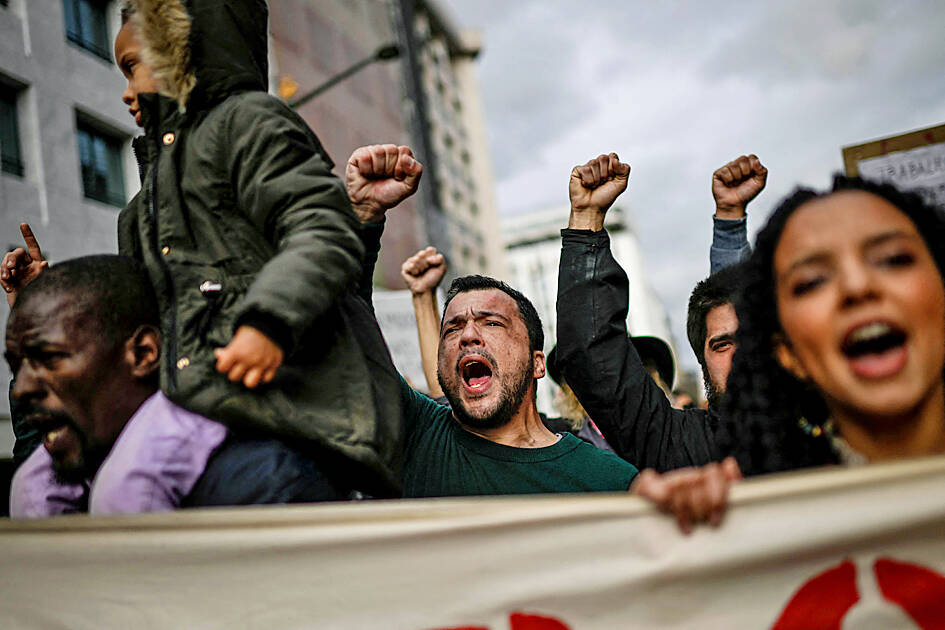Thousands took to Lisbon’s streets on Saturday to demand better living conditions at a time high inflation is making it even tougher for people to make ends meet.
Portugal is one of western Europe’s poorest countries, with government data showing more than 50 percent of workers earned less than 1,000 euros (US$1,057) per month last year. The monthly minimum wage is 760 euros.
House prices in Portugal rose 18.7 percent last year, the biggest increase in three decades, and rents have also increased significantly in part due to a speculative property bubble.

Photo: AFP
Low wages and high rents make Lisbon the world’s third-least viable city to live in, according to a study by insurance brokers CIA Landlords. Portugal’s 8.3 percent inflation rate has exacerbated the problem.
At the protest, which was organized by the “Fair Life” movement, Vitor David, a 26-year-old programmer, said he would like to move back to Lisbon one day, but had to live further out because of how expensive it was to rent in the city.
“It comes to a point in our lives that we have no hope,” he said, adding that he had already pondered moving to a wealthier European country. “It’s very hard.”
Official data show that about 20 percent of Portuguese live abroad.
“We are here so our voice is heard,” said Jose Reis, who recently graduated from university, but is still unemployed.
The Fair Life movement, which was created by people who live in Lisbon’s poorer outskirts, has said those who were already the most vulnerable before inflation soared were the ones being the hardest hit by the ongoing cost-of-living crisis.
They want higher wages, a cap on the prices of essential goods and government action on housing.
Portugal last week announced a hefty package of measures to tackle the housing crisis, but rights groups said the proposals would mean little if authorities continued to promote other policies to attract wealthy foreigners to the country, such as the Digital Nomads Visa introduced in October last year.

Packed crowds in India celebrating their cricket team’s victory ended in a deadly stampede on Wednesday, with 11 mainly young fans crushed to death, the local state’s chief minister said. Joyous cricket fans had come out to celebrate and welcome home their heroes, Royal Challengers Bengaluru, after they beat Punjab Kings in a roller-coaster Indian Premier League (IPL) cricket final on Tuesday night. However, the euphoria of the vast crowds in the southern tech city of Bengaluru ended in disaster, with Indian Prime Minister Narendra calling it “absolutely heartrending.” Karnataka Chief Minister Siddaramaiah said most of the deceased are young, with 11 dead

By 2027, Denmark would relocate its foreign convicts to a prison in Kosovo under a 200-million-euro (US$228.6 million) agreement that has raised concerns among non-governmental organizations (NGOs) and residents, but which could serve as a model for the rest of the EU. The agreement, reached in 2022 and ratified by Kosovar lawmakers last year, provides for the reception of up to 300 foreign prisoners sentenced in Denmark. They must not have been convicted of terrorism or war crimes, or have a mental condition or terminal disease. Once their sentence is completed in Kosovan, they would be deported to their home country. In

DENIAL: Musk said that the ‘New York Times was lying their ass off,’ after it reported he used so much drugs that he developed bladder problems Elon Musk on Saturday denied a report that he used ketamine and other drugs extensively last year on the US presidential campaign trail. The New York Times on Friday reported that the billionaire adviser to US President Donald Trump used so much ketamine, a powerful anesthetic, that he developed bladder problems. The newspaper said the world’s richest person also took ecstasy and mushrooms, and traveled with a pill box last year, adding that it was not known whether Musk also took drugs while heading the so-called US Department of Government Efficiency (DOGE) after Trump took power in January. In a

LOST CONTACT: The mission carried payloads from Japan, the US and Taiwan’s National Central University, including a deep space radiation probe, ispace said Japanese company ispace said its uncrewed moon lander likely crashed onto the moon’s surface during its lunar touchdown attempt yesterday, marking another failure two years after its unsuccessful inaugural mission. Tokyo-based ispace had hoped to join US firms Intuitive Machines and Firefly Aerospace as companies that have accomplished commercial landings amid a global race for the moon, which includes state-run missions from China and India. A successful mission would have made ispace the first company outside the US to achieve a moon landing. Resilience, ispace’s second lunar lander, could not decelerate fast enough as it approached the moon, and the company has